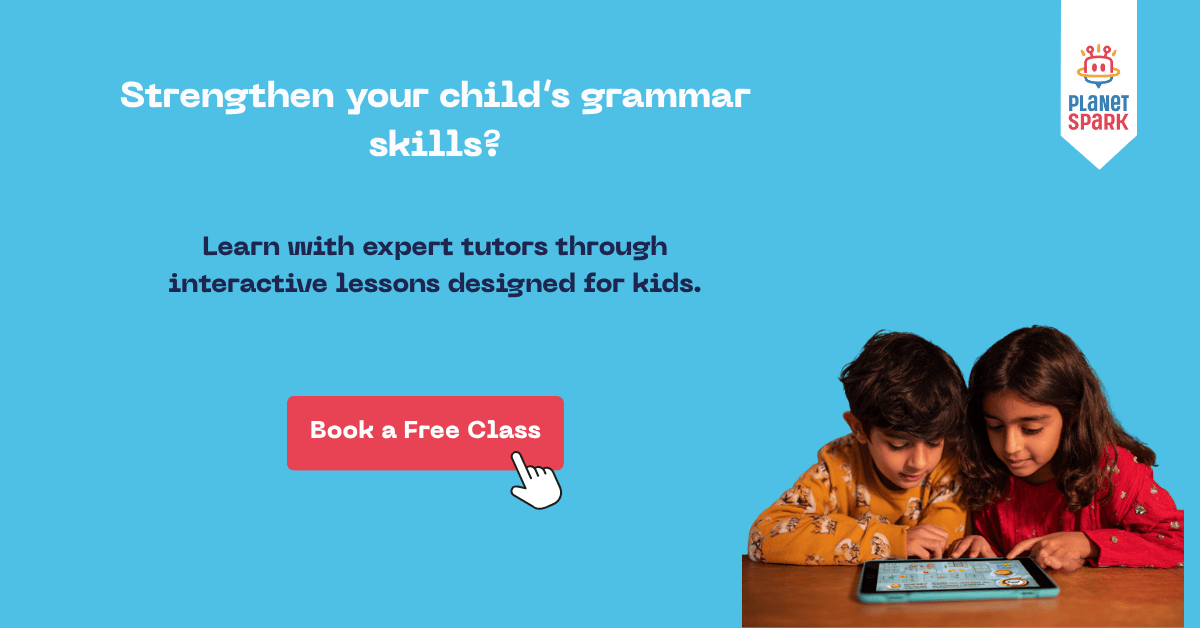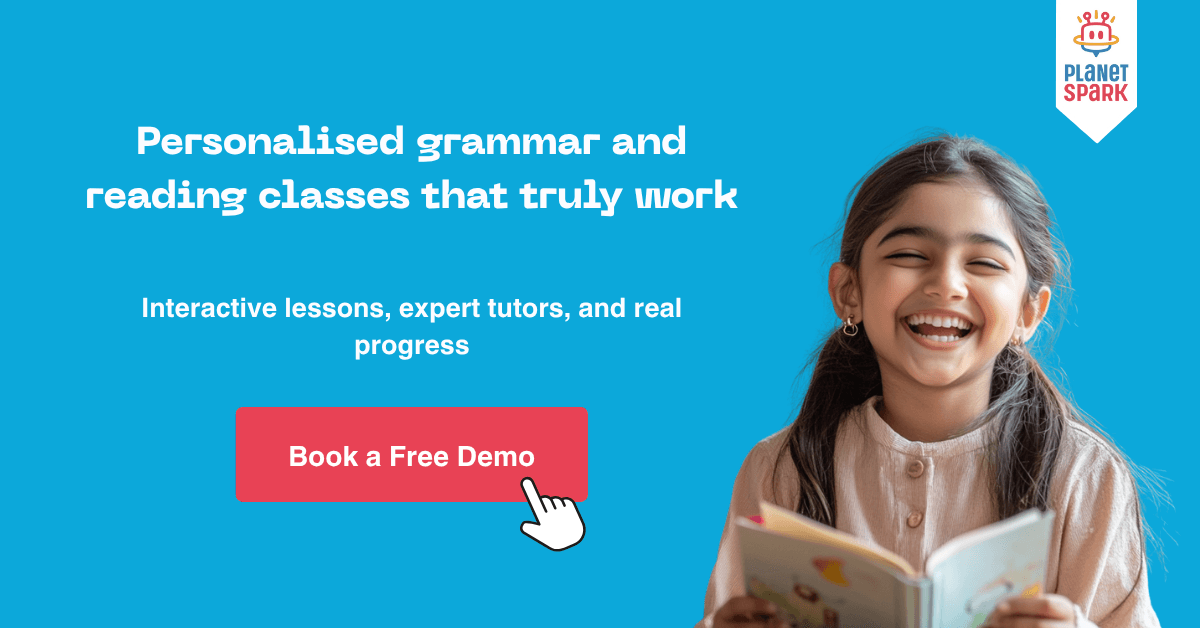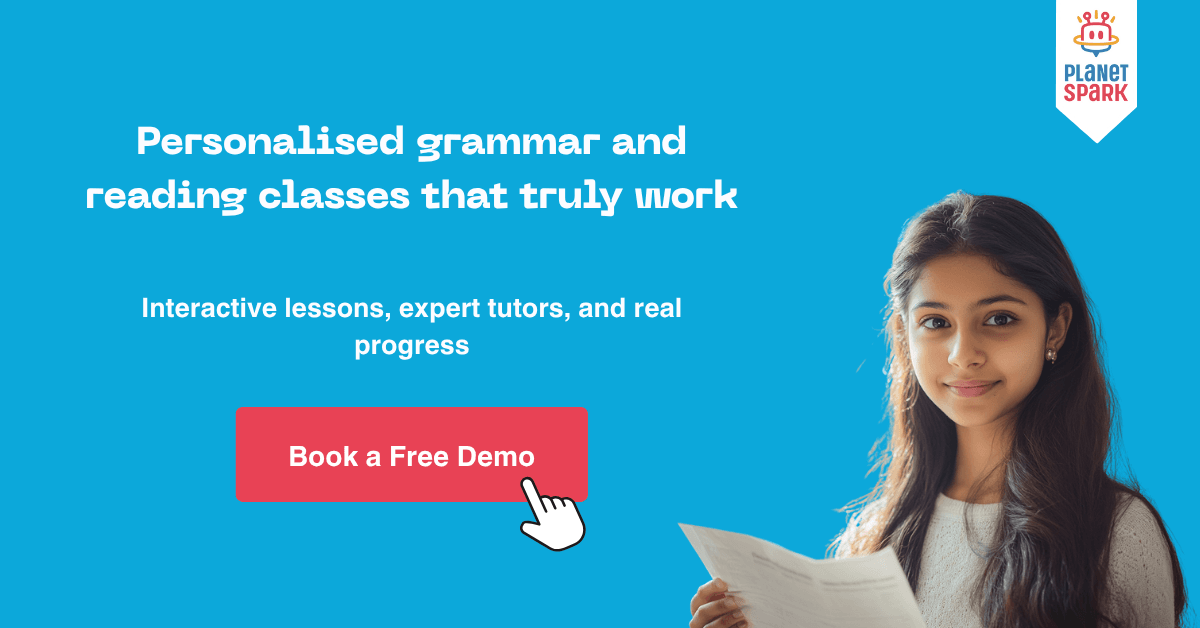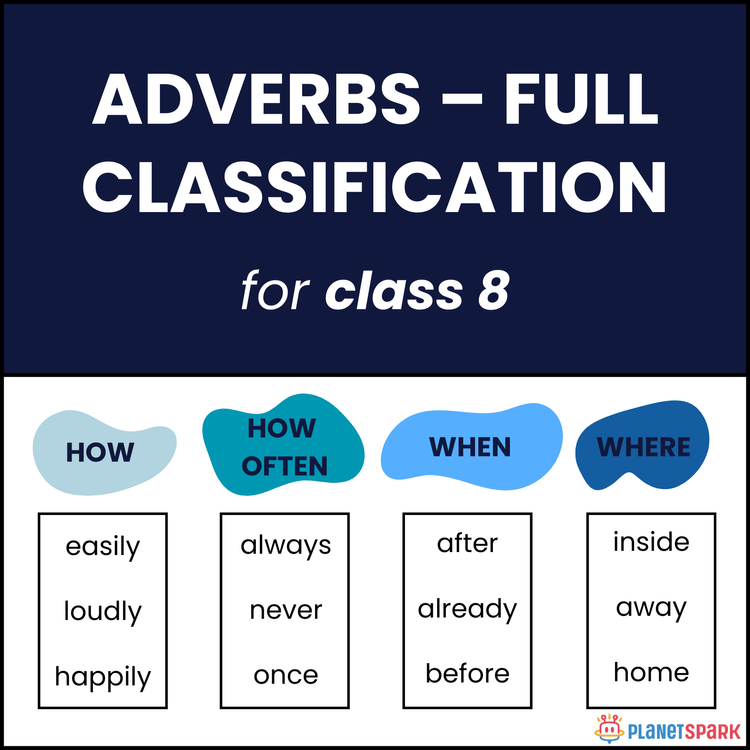Understanding Types of Sentences – Simple, Compound, and Complex
Last Updated At: 7 Aug 2025
9 min read

Table of Contents
- What is a Sentence?
- Why Learn About Types of Sentences?
- 1. Simple Sentences
- 2. Compound Sentences
- 3. Complex Sentences
- Comparing Simple, Compound, and Complex Sentences
- How to Identify Sentence Types
- More Practice Examples
- Common Mistakes to Avoid
- Benefits of Using Different Types of Sentences
- How to Teach Sentence Types to Kids
- Master English Grammar with PlanetSpark
- Frequently Asked Questions (FAQs)
When we speak or write, we use sentences to express our thoughts. But not all sentences are the same. Some are short and clear, while others are longer and carry more information. Understanding the different types of sentences helps us communicate more effectively. In English, the three main types of sentences based on structure are simple, compound, and complex. Let’s explore each one in detail with definitions, examples, and tips.
What is a Sentence?
A sentence is a group of words that express a complete thought. It must have:
- A subject (who or what the sentence is about)
- A verb (what the subject is doing or what is happening)
Example:
- She runs.
- The sun is shining.

Why Learn About Types of Sentences?
Knowing the types of sentences helps:
- Improve writing skills
- Build strong grammar foundations
- Create variety in writing
- Make communication clear
1. Simple Sentences
A simple sentence has just one independent clause. That means it has one subject and one verb. It expresses a complete thought.
Structure:
Subject + Verb (+ Object or Complement)
Examples:
- I play football.
- She is reading a book.
- The baby cried.
- The cat sleeps on the mat.
Learn all about sentence types with expert-led sessions at PlanetSpark.
Enroll today
Key Points:
- It has only one idea.
- It can have a compound subject or compound verb, but still remains a simple sentence.
More Examples:
- My brother and I went to the park. (compound subject)
- He ran and jumped. (compound verb)
Tip:
Use simple sentences when you want to make direct and clear statements.
2. Compound Sentences
A compound sentence has two or more independent clauses. These clauses are joined by:
- A coordinating conjunction (for, and, nor, but, or, yet, so)
- A semicolon (;)
Structure:
Independent Clause + [Conjunction/Semicolon] + Independent Clause
Examples:
- I wanted to go out, but it was raining.
- She cooked dinner, and he cleaned the kitchen.
- The sun set; the sky turned orange.
Coordinating Conjunctions (FANBOYS):
- For
- And
- Nor
- But
- Or
- Yet
- So
More Examples:
- He is smart, and he works hard.
- I could stay home, or I could go to the movie.
- She was tired, yet she continued studying.
Tip:
Use compound sentences to join related ideas and avoid repeating the same subject.
Strengthen your child’s writing with simple, compound, and complex sentences at PlanetSpark.
Book free demo
3. Complex Sentences
A complex sentence has one independent clause and at least one dependent clause. A dependent clause is a group of words that cannot stand alone as a complete sentence.
Structure:
Independent Clause + Dependent Clause (or vice versa)
Common Subordinating Conjunctions:
- because
- although
- while
- when
- if
- since
- unless
- before
- after
Examples:
- Because it was raining, we stayed inside.
- She smiled when she saw the puppy.
- Although he was late, he finished the test.
More Examples:
- If you study hard, you will pass the exam.
- I stayed at home because I was sick.
- After the show ended, we went to dinner.
Tip:
Use complex sentences to show a relationship between ideas, such as cause and effect, contrast, or time.

Comparing Simple, Compound, and Complex Sentences
| Type of Sentence | Number of Clauses | Examples |
|---|---|---|
| Simple | One independent clause | She dances. |
| Compound | Two independent clauses | She dances, and he sings. |
| Complex | One independent + one dependent clause | While she dances, he sings. |
How to Identify Sentence Types
Step-by-step:
- Find the subject and verb.
- Check how many clauses the sentence has.
- Look for conjunctions or linking words.
- Decide if each clause can stand alone (independent) or not (dependent).
Practice:
- Sentence: I wanted ice cream, but the shop was closed.
- Two independent clauses + coordinating conjunction (but) → Compound Sentence
- Sentence: When the bell rang, the students left the classroom.
- One dependent clause (When the bell rang) + one independent clause → Complex Sentence
- Sentence: The dog barked.
- One independent clause → Simple Sentence
Turn grammar rules into real writing skills with PlanetSpark’s English program.
Start learning today
More Practice Examples
Simple:
- Birds fly.
- He runs every day.
Compound:
- I washed the dishes, and she cleaned the floor.
- We can watch a movie, or we can go for a walk.
Complex:
- If you are hungry, eat something.
- Although she was tired, she finished the race.
Common Mistakes to Avoid
1. Comma Splice:
Joining two independent clauses with just a comma is incorrect.
Wrong: I went to school, I forgot my homework. Correct: I went to school, but I forgot my homework.
2. Run-on Sentences:
Two or more independent clauses joined without proper punctuation or conjunction.
Wrong: She likes coffee she drinks it every morning. Correct: She likes coffee, and she drinks it every morning.
3. Fragments:
A sentence that is missing a subject, verb, or complete thought.
Wrong: Because I was late. Correct: Because I was late, I missed the bus.
Benefits of Using Different Types of Sentences
- Simple Sentences: Make writing clear and easy to follow.
- Compound Sentences: Add balance and rhythm.
- Complex Sentences: Show deeper relationships between ideas.
Example Paragraph Using All Types:
"I love reading. (Simple) I read every night, and I finish one book a week. (Compound) Because reading helps me relax, I sleep better. (Complex)

How to Teach Sentence Types to Kids
1. Use Visual Aids:
Create charts or flashcards with examples of each type.
2. Color Coding:
Highlight subjects, verbs, and conjunctions in different colors.
3. Story Building:
Start with a simple sentence and let students add parts to make it compound or complex.
4. Sentence Sorting Activity:
Give children different sentences and ask them to sort them into simple, compound, or complex.
Learning the types of sentences is essential for mastering English grammar. It helps in writing essays, letters, stories, and even emails. The better you understand sentence structures, the more confident and creative you become as a communicator.
Practice every day. Read books. Try forming different sentence types from your daily routine. And remember, every long and beautiful paragraph starts with one simple sentence.
Master English Grammar with PlanetSpark
Understanding the types of sentences is just the beginning of mastering English grammar. If you’re looking to take your child’s grammar and communication skills to the next level, the PlanetSpark English Grammar Course is the perfect choice. Tailored specifically for school-age learners, this course blends expert instruction with interactive learning to make grammar fun, engaging, and easy to understand.
Why Choose PlanetSpark?
At PlanetSpark, we believe that grammar is not just about rules—it's about empowering children to express themselves clearly and confidently. Our courses are designed by language experts and are aligned with modern school curriculums, ensuring your child builds a solid foundation in English.
Make grammar fun and engaging for your child with PlanetSpark’s interactive course.
Join the course now
Key Features of the Course
Live Classes with Expert Trainers: Every session is conducted live by highly trained grammar experts who focus on concept clarity and student interaction.
Interactive Learning Materials: Children learn through activities, quizzes, animations, and story-based exercises, making each grammar concept come alive.
Personalized Attention: With small class sizes or one-on-one formats, every child gets the attention they need to truly grasp complex topics like sentence structure, punctuation, and parts of speech.
Real-Life Application: The course doesn’t stop at definitions. Students are encouraged to apply grammar in everyday writing, school assignments, and creative exercises.
Regular Assessments: Track your child’s progress through periodic tests, assignments, and teacher feedback reports.
What Will Your Child Learn?
The English Grammar Course covers all major grammar topics, including:
Sentence Types (Simple, Compound, Complex)
Parts of Speech (Nouns, Verbs, Adjectives, etc.)
Tenses and Sentence Construction
Punctuation and Capitalization
Subject-Verb Agreement
Error Correction and Editing
All topics are taught using real-world examples and student-friendly explanations to ensure lasting understanding.
Ideal for Kids in Grades 2 to 8
Whether your child is just starting with basic grammar or wants to sharpen their writing skills, the PlanetSpark English Grammar Course adapts to their level and pace. It's ideal for students in Grades 2 to 8, but flexible enough to accommodate learners at different stages.
Build Confidence Beyond the Classroom
Good grammar is not only important for academic success—it also builds confidence in speaking, writing, and public communication. With PlanetSpark, children don’t just memorize grammar rules—they learn to use them creatively in essays, speeches, and conversations.
Thousands of parents trust PlanetSpark to give their children the edge in communication and English excellence. If you want your child to write better, speak confidently, and build a strong grammar foundation, this is the course for you.
Start your child’s grammar journey with PlanetSpark today.
Frequently Asked Questions (FAQs)
Q1. What is a simple sentence?
A simple sentence has one subject and one verb. Example: "She sings."
Q2. What makes a compound sentence?
A compound sentence has two independent clauses joined by a conjunction. Example: "I went home, and I slept."
Q3. What is a complex sentence?
A complex sentence has one independent clause and one or more dependent clauses. Example: "Although it was raining, we went outside."
Q4. How can I teach sentence types to kids?
Use games, visuals, and examples. Practice with familiar words and daily situations.
Q5. What is the PlanetSpark Public Speaking Course?
The PlanetSpark Public Speaking Course is a structured, interactive program designed to help children build confidence, improve communication, and develop stage presence through live sessions, real-world activities, and expert mentorship.
Q6. Who can join the PlanetSpark Public Speaking Course?
The course is ideal for children aged 6 to 15 years who want to overcome stage fear, speak confidently, and learn the art of structured communication in English.
Q7. What skills does the course cover?
The course covers a wide range of public speaking skills, including:
Speech writing and delivery
Voice modulation and body language
Debate and extempore techniques
Storytelling and anchoring
Persuasive and informative speaking
Q8. How are classes conducted?
Classes are conducted live and online, either one-on-one or in small groups. Each session includes interactive exercises, performance practice, feedback, and recorded sessions for revision.
Q9. Will my child get to perform or present publicly?
Yes! PlanetSpark offers monthly events, speech contests, and open mic sessions where students present in front of live audiences—parents, teachers, and peers—which helps boost real-world confidence.
Download Free Worksheets
Personalized Communication Report
Record a video to get a AI generated personalized communication report for your child
Select Learner's Class

Hi There, want to try these
tips for your child with
LIVE with our expert coach?
Let's check your child's
English fluency
